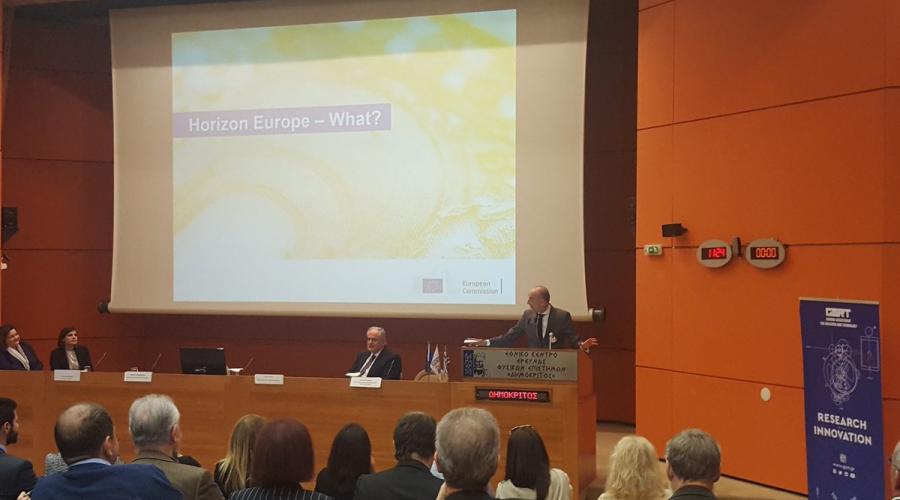
In a crowded amphitheatre at the National Centre for Scientific Research (NCSR) ‘Demokritos’, the Deputy Minister for Education, Research and Religion K. Fotakis welcomed J.E. Paquet, Director-General of DG Research and Innovation, European Commission, key speaker at the event organised by the General Secretariat for Research & Technology (GSRT) for the presentation of Horizon Europe - the next EU Framework Programme for Research and Innovation.
In his speech, J.E. Paquet, addressing members of the research, business and scientific communities, stressed the need for further promotion of the value of research to society and extolled the potential of the country. He made particular reference to the very important initiatives of Greece to promote excellence and strengthen human capital. He then presented the three pillars of Horizon Europe: Open Science, Global Challenges and Industrial Competitiveness, Open Innovation.
The Director-General of DG Research and Innovation stressed that this ambitious project will help address the many challenges associated with climate change, digital technology, health, food, natural resources etc. He also noted that the third pillar is revolutionary combined with the creation of a European Innovation Council. As he explained, for the next EU long-term budget for the period 2021-2027, the Commission proposes to allocate 100 billion euros to research and innovation, 94 billion of which will go to the ‘Horizon Europe Programme’.
K. Fotakis pointed out that expenditures for Research and Development in Greece reached a record high in 2017, exceeding 2 billion euros and reaching 1.14% of GDP. The General Secretary for Research and Technology, P. Kyprianidou stated: ‘Greece participates in all the major European initiatives addressing the challenges of our times such as Artificial Intelligence for Europe, European HPC (European High Performance Computing and ΕΟSC (European Open Science Cloud) and through the action ‘Research-Create-Innovate’ has publicly funded technologies of the so-called 4th Industrial Revolution.’
The most ambitious European research and innovation programme to date
Horizon Europe will cover the period 2021-2017 and is the successor to Horizon 2020. Among the new features of Horizon Europe, is the creation of the European Innovation Council (EIC). The EIC, which is already in its pilot phase, will be a unified service enabling disruptive and revolutionary innovations to be transferred from the laboratory to commercial applications and help startups and small businesses to develop their ideas on a larger scale. It will provide direct support to innovators through two main instruments, one for the first stage and another for development and marketing and will operate complementary to the European Institute of Innovation and Technology (EIT).
The new programme will continue to promote scientific excellence through the European Research Council (ERC) and ‘Marie Skłodowska-Curie’ grants and exchanges and will benefit from scientific advice, technical support and special research of the Joint Research Centre, the Commission’s department for science and knowledge.
EKT National Contact Point for European research programmes
The National Documentation Centre (EKT) has been National Contact Point for European research, technology and innovation programmes since 1992. It covers all stages of the research project, from preparation of a proposal to implementation and exploitation of research results. EKT’s services include: Information and Advisory Services, Helpdesk, Development and Handling of informational material, Organisation of events and seminars, Partner search for joint ventures and the publication of statistical data and performance indicators.








